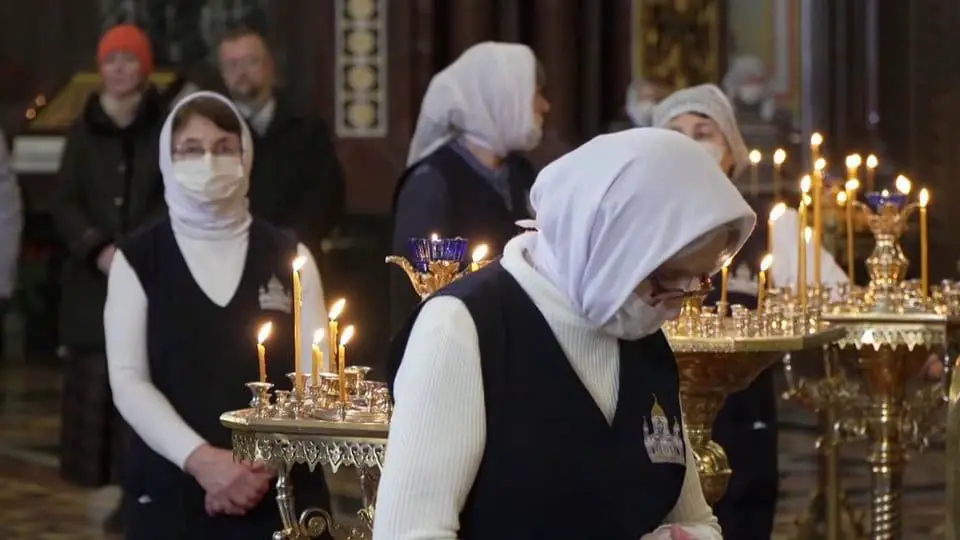Quarantine Diaries is a series of free language lessons. Each can take a variety of forms but all focus on building intermediate and advanced vocabulary and listening skills. After the brief introduction, watch the Russian news report below and then read the side-by-side translation of the transcript as provided by First Channel. Then, answer the questions provided.
The global health crisis has affected all aspects of life, including holidays and religious observance.
In Russia, Easter is by far the most popular religious holiday. Priests spend much of day blessing eggs, kulichi, and any number of other items brought by long lines of church-goers. This year, however, the church has officially cancelled all in-person rites and has promised to hold online events instead. This has met mixed public reception, however; the physical spray of holy water in the presence of a priest and church is essential to how the holiday is traditionally celebrated.
The church has struggled with other aspects of religious life as well such as discouraging people from the centuries-old practice of kissing icons in churches. Tragically, funerals are also now held under tightly restricted measures and graveyards are otherwise closed.
The below report focuses on how the current quarantine is affecting plans for Orthodox Easter, due to occur on April 19th, and the traditions surrounding and leading up to the important Easter observances. The transcript below it is as supplied by First Channel and presented with a side-by-side translation prepared by SRAS and presented on Folkways as part of our Quarantine Diaries series looking at how life in Russia has been changed by the global health crisis.
https://www.youtube.com/watch?v=66s8FxWDv88
Оставаться дома и участвовать в литургиях дистанционно (онлайн). Освящать веточки веры, куличи и крашеные яйца. Вербное воскресенье Закрыли кладбища - в том числе, и на день Пасхи. Ходить на кладбище (на могилы близких). Да, отличия можно найти в каждом абзаце. Помимо этого, в тексте внизу слова патриарха приведены полностью, а на видео - в усеченном варианте. 1. Что советуют делать православным верующим в период коронавируса?
2. Как по-русски называют воскресенье за неделю до Пасхи?
3. Какие меры приняли в Москве и Санкт-Петербурге, чтобы сдержать распространение вируса?
4. Что не является христианской традицией в день Пасхи?
5. Отличается ли текст внизу от того, который был прочитан на видео? Какие есть отличия?
| Российских верующих просят оставаться дома, а в литургиях принимать участие в режиме онлайн | Religious Russians Asked to Stay Home, Take Part in Liturgies Online |
| У православных в России — Лазарева суббота. Праздник в преддверии Пасхи, который напоминает о победе жизни над смертью. В храмах идут богослужения, но верующих просят оставаться дома, а в литургии принимать участие онлайн, чтобы не способствовать распространению коронавируса.
12 апреля — Вербное воскресенье, неделя до Пасхи. Накануне в церквях обычно освящают веточки вербы, потом их несут домой. Но сегодня верующим советуют сделать это, не покидая квартир. Также дома на этот раз советуют освящать куличи и крашеные яйца. О необходимости соблюдать самоизоляцию еще в конце марта говорил патриарх. «Я призываю вас, мои дорогие, в ближайшие дни, пока не будет особого патриаршего благословения, воздержаться от посещения храмов. 51 год я проповедую с кафедр, призывая людей приходить в храмы, преодолевать тяготение своей собственной злой воли и внешних обстоятельств. Я этому призыву я посвятил всю свою жизнь! И, надеюсь, вы понимаете, как трудно мне сегодня сказать: воздержитесь от посещения храмов», — призвал патриарх. Чтобы сдержать распространение коронавируса, в Москве, Подмосковье, Санкт-Петербурге, Ленинградской области и некоторых других регионах закрыли кладбища. Погребения — только в присутствии ближайших родственников. Просто посетить могилы близких пока нельзя. Это распространяется и на день Пасхи. В Русской православной церкви подчеркивают: идти в этот праздник на кладбище вообще не является христианской традицией. Запрет будет действовать вплоть до отмены особого режима, то есть точно до конца апреля. |
Russia’s Orthodox faithful are marking Lazarus Saturday. This holiday, which comes just before Easter, also reminds us of life’s victory over death. Church services are being held. However, believers are being asked to stay at home and take part in the liturgy online so as to not contribute to the spread of coronavirus.
April 12 will be Palm Sunday, marking one week before Easter. The night before, willow branches are consecrated at church and then taken home. But today, believers are asked to do this without leaving their apartments. The traditional consecration of Easter cakes and colored eggs is also to be done at home this year. At the end of March, the Russian Orthodox Patriarch spoke of the necessity to maintain the self-isolation regime. “I urge you, my dears, in the coming days, until there is a special patriarchal blessing, to refrain from visiting churches. For 51 years I have been preaching from the pulpits, urging people to come to church, to overcome the gravity of their own evil will and external circumstances. I have devoted my whole life to this call! And I hope you understand how difficult it is for me to say today: abstain from visiting churches,” the patriarch urged. To curb the spread of coronavirus, cemeteries have been closed in Moscow, The Moscow Region, St. Petersburg, The Leningrad Region and some other regions. Burials are to be done only in the presence of immediate relatives. Visiting the graves of loved ones is also not allowed. This will apply Easter as well (when it is traditionally done). The Russian Orthodox Church has emphasized that Easter cemetery visits are not a Christian tradition at all. The ban on visiting cemeteries will be in place until the self-isolation regime is lifted, that is, until exactly at the end of April. |





